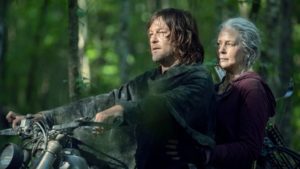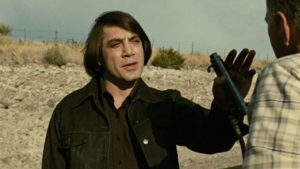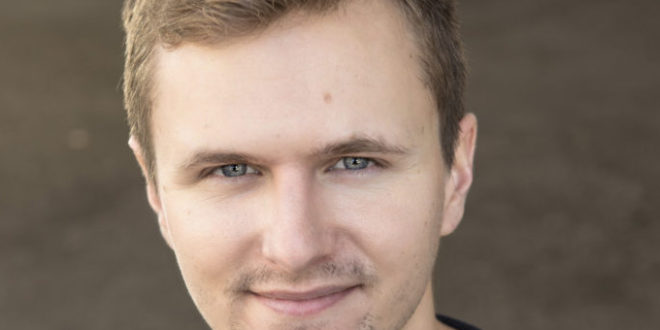Sam Ewing has composition and music/sound department credits on TV series like The Walking Dead, Black Mirror, Into the Dark, Agents of S.H.I.E.L.D and Defiance. For films, he’s been involved with The Forest, 10 Cloverfield Lane (2016 – read our review here), Colossal (2016 – read our review here), Happy Death Day (2017 – read our review here) and The First Purge, among others. He also has composed music for the video game, God of War. It was fun and interesting to hear Ewing’s views on composition in general, and also his thoughts on his favorite pieces.
PopHorror: This is a horror site, so we always ask: what’s your favorite scary movie?
Sam Ewing: The Shining. Even though the vast majority of its score is licensed classical music, the use of it was mind-bendingly profound for me. The music constantly has the viewer on edge and fills the atmosphere with palpable tension and discord from start to finish, whether you’re seeing said tension onscreen or not. Of course, the acting and directing and plethora of other factors make it terrifying – but its music was eye – and ear – opening for me.
[NOTE: The interviewer understands this choice, as The Shining inspired him to actually buy CDs from Krzysztof Penderecki, whose music is featured rather prominently in the film.]
PopHorror: What’s your favorite movie/TV series that you were a part of and why?
Sam Ewing: I’m going to have to go with The Walking Dead. I’ve been a part of the music crew since Season 5, and have witnessed dramatic changes in tone since then that have affected music and many other facets of production. But there’s something about the longevity of such a project that has made people working together on The Walking Dead a real family. There’s such a saturation of content, so it’s uncommon to have a project that lives for 10 seasons. It’s amazing and I love this team.
Favorite Moments

PopHorror: What is your favorite composition you’ve been a part of?
Sam Ewing: I’m really happy with how the “Heads On The Pikes” sequence came out in 9×15 of The Walking Dead. We went really dramatic with the music, and show runner Angela Kang, gave Bear McCreary and the music team the license to be dramatic. I think it stands out as a special piece for me, and probably for viewers. It’s unusually classical sounding, because the scope of what happened in the scene was so big – so we pushed the boundaries a bit.
PopHorror: What is your favorite piece of music you didn’t write?
Sam Ewing: Anything from John Williams’ Jurassic Park score. “Journey to the Island” is an obvious choice and has a nostalgic place in my heart, but I particularly love the less listened-to horror/action pieces in the score. “Incident on Isla Nublar” and “High Wire Stunts” are jam packed with brilliantly dissonant and propulsive orchestral writing.
Musical Knowledge
PopHorror: In your view, how much musical knowledge is required to become a successful composer?
Sam Ewing: Sadly, not much. If you’re neighbors with a filmmaker, and you strike up the right conversation at the right time, you might find yourself scoring a new hit show or movie. Connections are often the most valuable thing. I don’t think every filmmaker cares how much “music knowledge” you have. They do need to like your music, though. In today’s world, there are so many technological tools to create music that deep knowledge of theory isn’t so necessary anymore to be successful by any measure. That being said, my opinion is that anyone who has such a desire to enter the industry should put their years of study in. It’s profoundly important to be able to speak, read, and communicate the language in order to be a truly successful artist and be respected by peers.
PopHorror: What is the most challenging aspect of composing music for The Walking Dead?
Sam Ewing: I think it is navigating the shifting tones that the series has gone through. I will say that Bear McCreary has done wonderfully since Season 1. The music went from Bernard Herrmann-sized string ensembles and electric banjo to solo piano to Godzilla-sized epic action, to intimate, electronic synthesizers, to solo fiddle and acoustic guitar. It’s difficult to wear that many hats, but that’s often what is called for in the job as a film composer.
PopHorror: IMDb lists you on God of War. Do you have a favorite Greek God (someone on my trivia team wanted me to ask!)?

Sam Ewing: Zeus. Throwing lightning bolts from the sky will always be the most epic act that a Greek god can carry out, in my opinion.
PopHorror: There are free synthesizers and free recording software online. Do you ever utilize things like that?
Sam Ewing: Absolutely. Paul Stretch is a favorite free program of mine. It is elementary and maybe even ancient in its interface, but the sounds you can get out of it are unlike anything that comes with a DAW that you spend $600 on. Justin Bieber slowed down x800 on YouTube, for example. That was the free program, Paul Stretch. I’m guessing a really nice and brilliant guy named Paul decided to make a Stretch program, and it’s guys like him that unlock the full creative potential in we composers.
Recognition vs. Subtlety
PopHorror: What’s the best way to create recognizable pieces?
Sam Ewing:I think great melodies are the ticket, the composing of which is insanely difficult to learn or teach. It’s something that has to be felt. Often, a great melodic component plus a great rhythmic component combine to make something that one could either hum or beat box, and either way, be able to recognize. Also, if it can breach genres and instrumentation, then you’ve got something magical.
PopHorror: In contrast, sometimes a scene may require subtle music that’s not instantly noticeable. What’s the best approach for subtlety?

Sam Ewing: I happen to love subtlety. I think when it comes to scoring, a thing to think about is letting the scene do the work. The bank robbery scene in Heat (1995) has a simple, soloistic drum pattern repeating for what feels like 10 minutes. It never evolves. It’s brilliant because it literally stays suspended in an infinite loop.
I think at a certain point, the viewer is subconsciously begging for something to change, either in the music or in the scene, so they’re very much put on edge. And often, no music is the best course of action. No Country For Old Men [read the PopHorror retro review here] is one of my favorite films, and it has no underscore at all. I would argue that the lack of score makes it one of the most tense films made in recent history. So, patience and holding your breath are really key in creating subtlety.
PopHorror: What are you most looking forward to in Season 10 of The Walking Dead?
Sam Ewing: I look forward to developing my creative relationship with both Bear McCreary and Angela Kang. I just feel really lucky to be getting to work with them closely on a show whose first season I used to watch on my laptop. I look forward to generating more creative and cool ideas with them in the future for The Walking Dead.
PopHorror would again like to thank Sam Ewing for answering our questions. Hopefully, some of you will feel inspired to create music of your own, or maybe even try your hand at composing music for others! Feel free to share your thoughts in the comments!
 PopHorror Let's Get Scared
PopHorror Let's Get Scared




